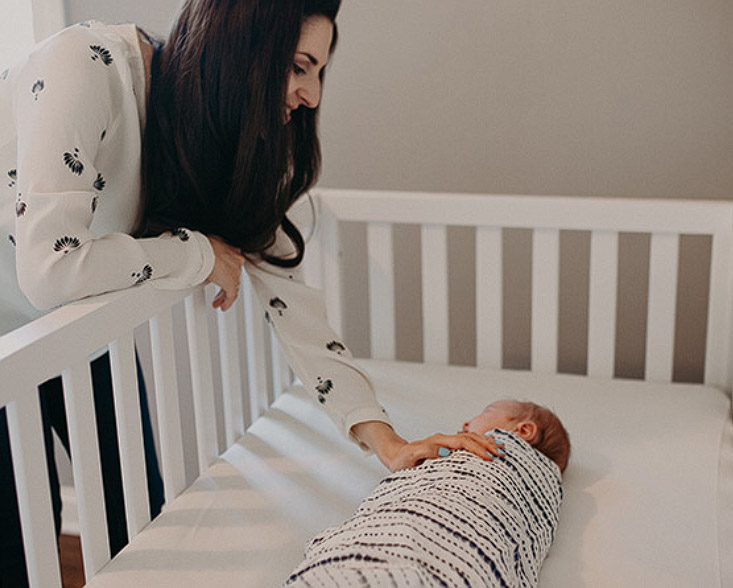Roomsharing and Safe Sleeping for Newborns
Roomsharing and Safe Sleeping for Newborns
Currently, American Academy of Pediatrics (AAP) recommendations say that infants should room-share until at least 6 months (and longer if mothers continue to feed at night) for SIDS prevention and safe sleeping for newborns.

What Do You Mean by Roomsharing?
Roomsharing is when a newborn sleeps on an independent sleep surface in the parent’s room for easy access and safety. (This is not the same thing as bedsharing which is when a child sleeps in the same bed as their parent).
Having the baby in a crib right next to you, in a bassinet that you can reach over and touch, or in a “co-sleeper” that attaches to the side of your bed makes it easy to feed them at night without having to get up. You have the peace of mind of having your baby literally at your fingertips, but you don’t have to worry about the safety challenges of bed-sharing. For moms who have had C-sections and have difficulty getting up and moving around for the first few weeks, this setup can be particularly helpful.
You’ll also want to consider a backup plan in case roomsharing doesn’t work well for either your baby or you. Perhaps you find that your baby is particularly sensitive to your partner’s snoring. Or you are unable to sleep because you pop up every time you hear your baby stirring? Your backup plan may be moving the bassinet into another room and even having one parent sleep on a separate mattress next to it. Make sure you have discussed your roomsharing plan with your partner and are making choices that support your family’s well-being and provide safe sleeping for your newborn.
Sudden Infant Death Syndrome (SIDS)
Sudden infant death syndrome (SIDS) is the unexplained death, usually during sleep, of a seemingly healthy baby within the first year. SIDS is also known as crib death because the newborn often dies in their crib.
The exact cause of SIDS is unknown, but it is thought to be related to an inability to get sufficient oxygen. Either the infant’s access to air is blocked because of their position (on their stomach or too close to pillows or blankets), or their ability to breathe is hampered by deep sleep caused by the comfortable stomach position.
Although the exact cause is unknown, several recommendations correlate highly with the prevention, and you’ll see references to SIDS prevention and safe sleeping for newborns in my new book launching on March 21, 2023, The Sleep Lady’s Gentle Newborn Sleep. Guide
Safe Sleeping for Newborns Finding
In 2022, the AAP stated that evidence shows sleeping in the parents’ room on a separate, safe surface lowers the chance of SIDS by as much as 50 percent.
First Candle, an organization devoted to reducing sudden infant deaths shares their top ten safe sleep for newborns recommendations:
- Always place the baby on their back for every sleep time.
- Use a firm and flat sleep surface covered with a tight-fitting sheet.
- Keep soft objects and loose bedding out of the baby’s sleep area. There should be nothing in the sleep area but the baby.
- Room sharing is safer than bed sharing.
- Breastfeed if possible. Breastfeeding is even more effective at protecting against SIDS if it is done exclusively (not combined with formula).
- Avoid smoke exposure and alcohol and drug use (ever over-the-counter drugs) during pregnancy and after birth.
- Consider offering a pacifier at nap time and bedtime once breastfeeding is firmly established.
- When you get tired, put your baby down in a safe place: a crib, play yard, or bassinet.
- Practice supervised tummy time to build neck, arm, and shoulder muscles and get baby rocking, scooting, and crawling.
- Attend all well-baby checkups and immunize the baby on a schedule.
The post Roomsharing and Safe Sleeping for Newborns appeared first on The Sleep Lady.
https://ift.tt/3gYrXhL from The Sleep Lady https://ift.tt/L9btmIi



Post a Comment